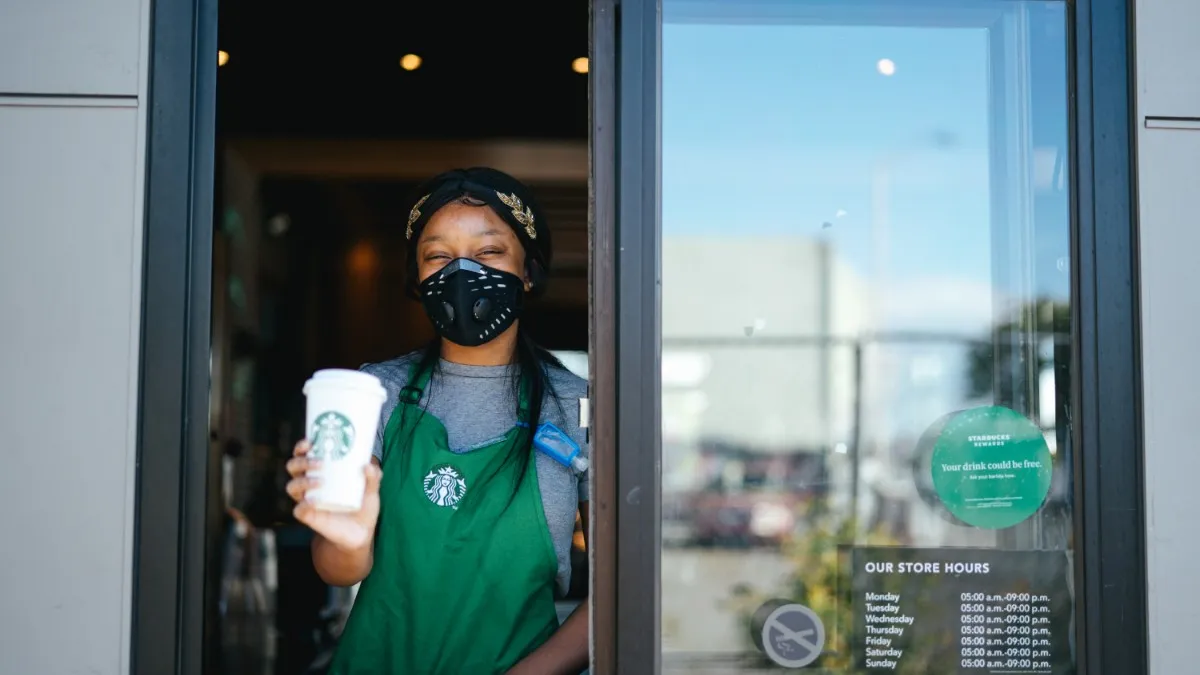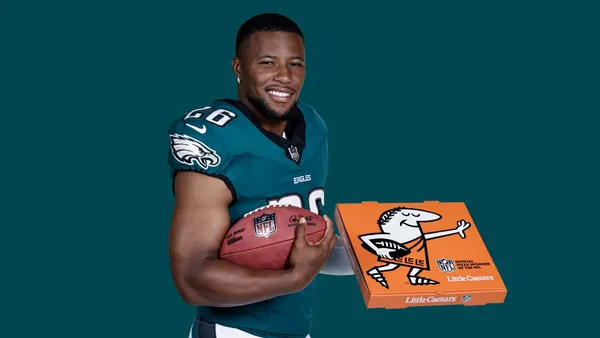Dive Brief:
- Starbucks will now allow employees to wear clothing and accessories that support the Black Lives Matter movement, COO Roz Brewer and VP of Inclusion and Diversity Zing Shaw told employees in a letter posted on its website Friday. The company has also designed 250,000 T-shirts to "demonstrate our allyship and show we stand together in unity" that feature phrases including "Black Lives Matter" and "No justice, No peace." Employees can wear their own BLM attire until these company T-shirts are available. Employees will receive additional operational guidance on June 15.
- This statement comes after BuzzFeed News released an internal Starbucks memo Wednesday that told employees wearing clothing and accessories that supports the Black Lives Matter movement could be misinterpreted and lead to violence. According to the publication, the bulletin also included a video of Shaw explaining that "agitators who misconstrue the fundamental principles" of the BLM movement could "intentionally repurpose them to amplify divisiveness."
- Starbucks' dress code prohibits attire that advocates a "political, religious or personal issue." A Starbucks spokesperson confirmed to BuzzFeed News yesterday that the memo was authentic and said that the company is "dedicated to ending systemic racism" but that its dress code policy would stay in place "to create a safe and welcoming" environment at Starbucks stores. "We respect all of our partners’ opinions and beliefs, and encourage them to bring their whole selves to work while adhering to our dress code policy," the spokesperson said.
Dive Insight:
Starbucks' decision to reverse its policy also followed widespread backlash on social media and calls to boycott the company. Employees also told BuzzFeed News in response to the initial ban on BLM attire that employees could wear attire that supports LGBTQ+ rights and that Starbucks has distributed pins and accessories supporting the LGBTQ+ community to partners in the past.
The company's about-face was swift, but its initial ban on BLM attire could damage its progressive reputation. This dress code policy change comes just two years after a widely publicized incident where a Philadelphia store manager called the police on two Black patrons, who were waiting on a third member of their party before ordering, and had them arrested. The following month, Starbucks closed its 8,000-plus U.S. locations for "several hours" on May 29 to train its employees on racial bias. This series of racial mistakes could make leadership appear disingenuous and make the policy change ring hollow.
Last week, Starbucks tweeted "Black lives matter. We are committed to being a part of the change." That came along with a more comprehensive statement that it is "actively hosting open and necessary conversations with our partners (employees) about racism the Black community faces." The company also announced that it is pledging $1 million "to organizations promoting racial equality and more inclusive and just communities" and has partnered with Arizona State University to create anti-bias resources and training.
The company also allowed employees at a Madison, Wisconsin store that had its windows shattered to paint a mural on the wood boarding up its storefront that includes the phrase "We will confront racism... We will not be bystanders" next to an image of a raised fist. The company shared photos of this display in a blog post, which also includes a statement from an employee that "The first Pride was actually a riot at Stonewall. That was an inflection point, and I do believe this is another inflection point. This is one of those moments where I think the tide is turning and change will happen."
But extending these messages of support online and initially denying employee requests to wear clothing supporting BLM — especially when the chain amplifies LGBTQ+ support during Pride month — frustrated employees.
Starbucks is far from the only restaurant to receive criticism for its dress code policy. Union Square Hospitality Group's Gramercy Tavern was sued last year by a gender non-conforming employee who claimed a dress code requiring them to wear a tie was discriminatory, and many chains have come under fire for discriminatory dress requirements for patrons.













